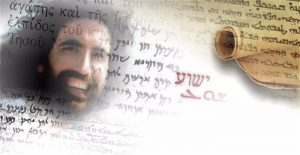The Bible was written in three languages: Hebrew, Aramaic, and Greek. Hebrew and Aramaic were the languages used for the Old Testament or Tanakh, and Greek for the New Testament.
But what language did Jesus speak? Did he use Aramaic, as has been claimed by most scholars, or did he speak Hebrew? The question is whether Hebrew was still a spoken language in the time of Jesus. In Acts 21, it is written about Paul, “He spoke to them in the Hebrew language.” And on his way to Damascus, Paul says, Jesus spoke to him in Hebrew: “I heard a voice saying to me in the Hebrew language, ‘Saul, Saul, why do you persecute me?’” (Acts 26)
 The earliest history of the Hebrew language is shrouded in mystery. But when Abraham settled in Canaan, he and his family evidently picked up the “language of Canaan.” After the exile in Babylon (587–539 BC), it seems that many Jews in the land were bilingual. But after the destruction of the temple in AD 70 and the Bar-Kochba uprising in AD 135, most of the Jewish population in the land was forced into exile, and Hebrew slowly ceased to be a spoken language.
The earliest history of the Hebrew language is shrouded in mystery. But when Abraham settled in Canaan, he and his family evidently picked up the “language of Canaan.” After the exile in Babylon (587–539 BC), it seems that many Jews in the land were bilingual. But after the destruction of the temple in AD 70 and the Bar-Kochba uprising in AD 135, most of the Jewish population in the land was forced into exile, and Hebrew slowly ceased to be a spoken language.
Whether Jesus spoke Hebrew or Aramaic was, and still is, a subject of debate. Aramaic was the lingua franca in the Middle East in the time of Jesus. But discoveries like the Dead Sea Scrolls in Qumran show us that Hebrew was still in use. Hebrew—and not only Aramaic—was probably a spoken language at that time. And while the Talmud was written in Aramaic, the Mishna was written in Hebrew. The Hebrew of the Mishna is not an artificial language which would have been used only by a scholarly elite; it is a kind of colloquial Hebrew.
In the Greek New Testament text, we find both Hebrew and Aramaic words and phrases:
Aramaic
Abba (Rom 8:15)
Ephphatha (Mark 7:34)
Marana tha (1 Cor 16:22)
Mammon (Matt 6:24)
Talitha qumi (Mark 5:41)
Hebrew
Amen (Matt 6:13)
Corban (Mark 7:11)
Hallelujah (Rev 19:1)
Sabbath (Acts 13:14)
Today, one of the main features of the Messianic movement in Israel is that believers speak modern Hebrew and use Hebrew in prayer and worship. The movement is becoming more and more native. We cannot be sure what language Jesus spoke; perhaps he spoke both Aramaic and Hebrew. But we do know that most of the followers of Jesus in Israel today speak Hebrew.
Eliezer Ben-Yehuda (1858–1922), the father of the modern Hebrew language, used to say “rak ivrit”—only Hebrew. He had a dream for the awakening of the Hebrew language, and his dream came true. The people of Israel have Hebrew, the language of the fathers and the prophets, as their official language. It is the first time in history that a language which ceased to be spoken in ancient times has come back to life.
Elisabeth E. Levy